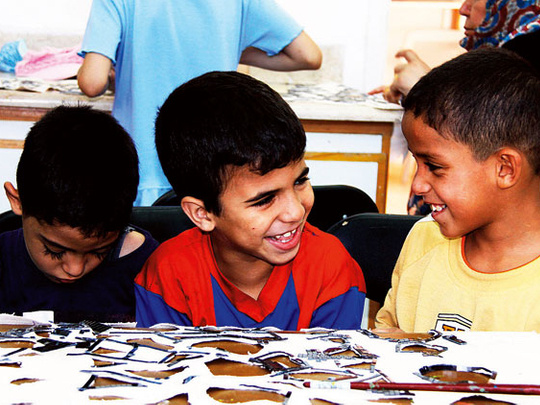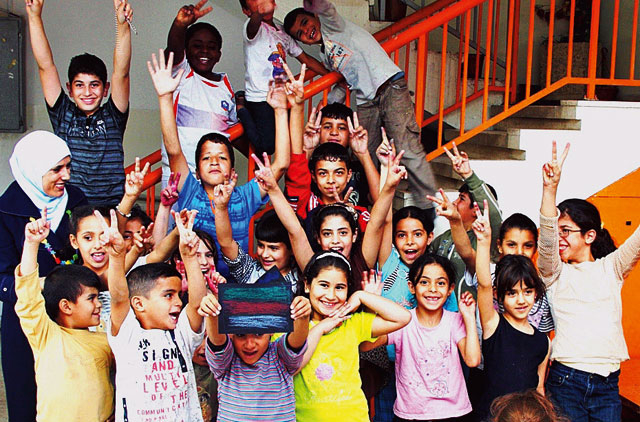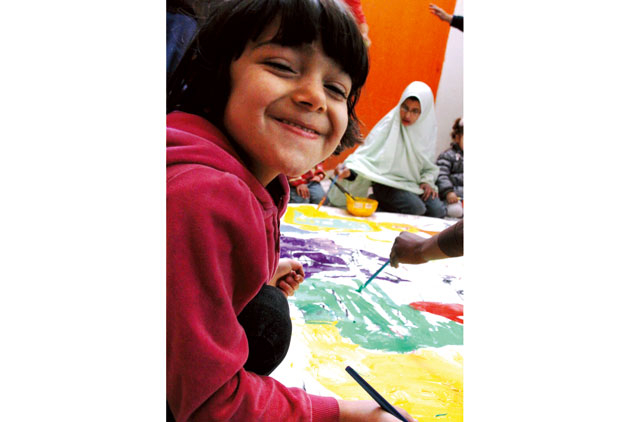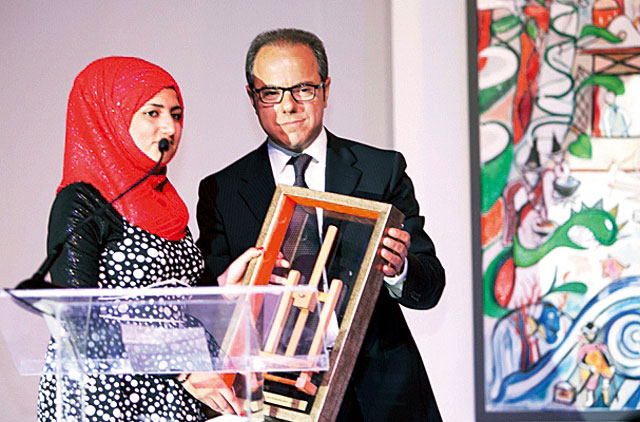
Her innocent, pretty face might make you think Nermeen Abu Shashieh has had an idyllic childhood. But the pictures she paints tell the real story. The distorted face of a child staring back at you in black and white from one corner of the canvas, tears streaming down her cheeks, reveal stories of untold horrors. But over the course of an art workshop, the same face starts to change as she adds primary colours. Eventually, it's a much happier, colourful face that looks back at the viewer.
The painting could be a metaphor for Nermeen's life in her native Palestine: a place that is punctuated by constant strife, uncertainty and violence.
Things got better when her family managed to escape to a refugee camp in neighbouring Jordan. But life as a refugee at the Al Hussain Camp was filled with stark memories and painful longing for her home country. However, in 2007 Nermeen's life was changed by art.
Start, a Dubai-based charity, launched by Art Dubai and Al Madad Foundation aims to make a difference in the lives of economically and culturally deprived children in the Middle East through art classes.
"I've always been fascinated by art,'' says Nermeen, who is now 17. "When I was little I dreamt I would study something related to art." The classes were a way for Nermeen and the other students to escape the nightmare of their reality in the camp. A whole new world of possibilities opened up. Four years later, she managed to realise her dream and was awarded the Start Scholarship this year. "I've always wished to become an architect," she says. "I aspire to become a leading architect and change the skyline of Jordan."
The Start Scholarship has given Nermeen the opportunity to attend Jordan University to study architecture for a five-year degree programme. During this time, she will volunteer at Start workshops, mentor younger students and teach them the skills she is learning at university. "Nermeen has become a role model for other students," says Tanaz Dizadji, director of Start (www.startworld.org).
Closer to home, in the UAE, Start fulfils other objective by using art to give children with special needs a boost in life. Until last year, James Casaki, who has a passion for art, was attending Dubai Center for Special Needs. But the 23-year-old was keen to follow his dream of working in the arts, so he became involved with Start.
"We took him on for a year," says Tanaz. The very next year he won the Start Scholarship in 2011, allowing him to leave the centre and follow his dream. "Until I came to the Start art class I did not know how to do art," he says. "I have learned a lot of things during my scholarship and time with Start, like how to use Excel and to keep a diary for my tasks." James apprenticed at many art galleries, and just being around artists gave him a stronger sense of purpose. "Art is full of happiness and nice colours that make me smile," says James.
He suffers from Kabuki Syndrome - a congenital disorder with multiple congenital anomalies and intellectual disabilities. "He'd never worked full-time at anything," recalls Tanaz. "When he joined our programme, James was a bit restless and his mother was frustrated. He was very polite, a lovely boy, but shy and very nervous."
This year he interned at all the major art galleries across the UAE. Most importantly he's gained confidence. "He stood up on stage at our fund-raiser gala night in March this year and he was so confident," says Tanaz.
"He carries himself differently, he introduces himself these days. That's the best example of how Start has made a difference in a special needs person's life."
The power of art is phenomenal. Apart from being a source of pleasure, Start proves that it can also heal, educate and empower, particularly in James's case.
Empowering and healing youth
The organisation's name is meant to convey the intentions of the people behind the effort. The goal is to start creating a positive change in the lives of needy children. It also encourages professional artists to become volunteers in the field of humanitarian aid and education.
"It aims to create opportunities for children and young adults to become part of an international creative partnership. It's a programme that links child development with arts education," says Tanaz.
Providing an outlet for artistic creativity is not always the first thing people consider doing to help under-privileged children. But Tanaz is a firm believer that art is important for growing minds. "By no means are we trying to change these kids into artists. We are using art to help them deal with the complexes most of these children develop," she says.
"It helps special needs children through a medium other than language. They may not be able to communicate well verbally. But with art they can express themselves in many different ways. Participating in art workshops they get to meet a lot of different people and they become more confident and express themselves better. So whatever career they want to pursue, they understand how to present themselves and how to think out of the box."
Start began its arts education programmes at refugee camps and orphanages throughout Jordan, Lebanon and Palestine. It also designed and implemented workshops for children with special needs in the UAE and currently serves over 750 children a week. They plan to reach more in the near future.
It started by operating art workshops daily at Baqa'a refugee camp in Amman, Jordan for children between 11 and 16. Soon, Start's operations spread to Beirut and Palestine. The workshops are led by local and international artists who volunteer their time and they are supported by a trained teacher. "The aim is to give special needs and orphaned children a background in art history and technique," says Tanaz. "But the most important thing for us is to develop their creativity and confidence, and to give them an opportunity to express themselves."
The artists - Sacha Jafri, Farhad Moshiri, Safwan Dahoul, Patrica Millns, Nadim Karam, Ebtisam Abdulaziz, Sara Naim and Lisa Widemann, among many others - decide on the content of workshops.
"It's quite inspirational for the artists as well," Tanaz says. "They get to work with the kids and they also get studio space in the Start house and get to work on the paintings for their own exhibitions.
"The kids love it. They love having artists teach them their craft," says Tanaz. "They get very excited - it's the highlight of their day. These kids are not just coming to paint pretty pictures, but are learning about the history of all kinds of art, including architecture," says Tanaz.
It's not just artists who volunteer at Start. "We also have actresses, photographers, filmmakers... and anybody connected with any form of art," she says. "We want the kids to be enriched by our programme, not only in terms of learning the history of art, but also in learning to be more creative and more confident, and we want them to learn how to interact with each other."
A common language
There's another reason art is used as a medium. "You see, art has no language," explains Tanaz. "Sometimes, some artists who come to our camps don't speak a word of Arabic, and the kids don't speak English. But it's no problem. They manage to communicate with each other. At the end of it they are the best of friends. And it's all because of art."
Tanaz says there are still many children who are waiting to benefit from Start's programmes, but who can't due to a lack of funding. "Realistically, we need to double our staff in all the countries because the demand is much more than we can provide."
Start, which relies on corporate sponsors and philanthropists for funding, held an auction of work by renowned artists at its annual gala in March. The event raised $900,000 (Dh3.3 million) for the organisation. "Now, we can literally double our operations in the three countries. We want to reach more children," says Tanaz. Most of the money goes to expanding the programme and a tiny staff of six works to ensure that. The programme relies mostly on volunteers.
Start arranges exhibitions of the children's work in their countries. "We did an exhibition in Jordan in January this year," says Tanaz. "Around 2,000 children showed up to see it at the University of Jordan, Amman. It was really powerful."
Start's UAE programme, for special needs children and young adults, concentrates on art therapy. The organisation is now looking to expand to India in Asia's biggest slum, Dharavi in Mumbai, in the next couple of months. "There is so much to do there," says Tanaz.
If anyone has any doubts about the difference and positive impact Start is making in children's lives, they only have to look at Mohammad, an art teacher who volunteers with Start in Jordan.
"He's a Palestinian refugee who was discovered by the manager in the SOS village four years back," says Tanaz. "He went on to study art, put himself through school and went on to become an art teacher. When we started the art school in Jordan, somebody remembered him and contacted him and he came back to work with us. He relates so much to the kids because he was one of them not long ago. For me, it's amazing."
For the children, it's a lifeline.















